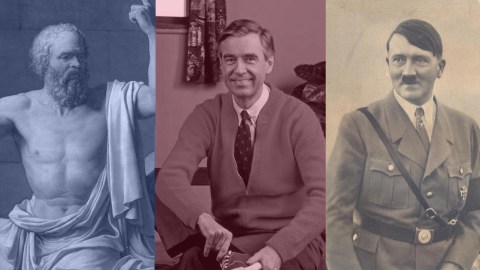7 of the greatest public speakers in history

A speech is more than a set of spoken words. It’s a combination of the speaker, the context, the language, and these things working together can make it far greater than the sum of its parts. In that vein, we compiled some of the greatest public speakers of all time, people whose words changed the course of societies and defined eras.
Winston Churchill
When Paris fell to the Nazis on June 14, 1940, England began to steel itself for the brunt of the Axis powers on the Western front. Winston Churchill, who had taken over as prime minister just a month prior, delivered his famous “Our Finest Hour” to a country bracing itself for full-scale attack. In 1953, Churchill was awarded the Nobel Prize in Literature, in part for his speeches, which he wrote himself.
In his history of World War II entitled “The Storm of War,” Andrew Roberts writes:
“Winston Churchill managed to combine the most magnificent use of English — usually short words, Anglo-Saxon words, Shakespearean. And also this incredibly powerful delivery. And he did it at a time when the world was in such peril from Nazism, that every word mattered.”
John F. Kennedy
Few speeches are as oft quoted as John F. Kennedy’s inaugural address, which he spent months writing. Kennedy’s ability to speak as if he was having an authentic conversation with an audience, as opposed to lecturing to them, is one quality that made him such a compelling communicator.
Socrates
Standing accused of crimes including corrupting the youth of Athens, Socrates had a choice: defer and apologize to his accusers for his alleged crimes, or reformulate their scattered accusations into proper legal form (thereby embarrassing his accusers) and deliver an exhaustive defense of the pursuit of truth, apologizing for nothing. He chose the latter and was sentenced to death. Part of Socrates’ “Apology” includes:
“How you have felt, O men of Athens, at hearing the speeches of my accusers, I cannot tell; but I know that their persuasive words almost made me forget who I was – such was the effect of them; and yet they have hardly spoken a word of truth. But many as their falsehoods were, there was one of them which quite amazed me; – I mean when they told you to be upon your guard, and not to let yourselves be deceived by the force of my eloquence.”
Adolf Hitler
Hitler was well aware that mastering the art of public speaking was crucial to his political career. He wrote all of his speeches himself, sometimes editing them more than five times. He practiced his facial expressions and gestures, and he was adept at interweaving metaphor and abstract ideas into his speeches about political policy.
Martin Luther King Jr.
The strong musicality of Martin Luther King Jr.’s rhetoric is perhaps just as recognizable as the words “not be judged on the color of their skin, but by the content of their character.” Martin Luther King drew inspiration from Shakespeare, the bible, his own past speeches, and numerous civil rights thinkers to write his “I Have a Dream” speech, one of the most famous of all time.
James Baldwin
Until his death in 1987, James Baldwin pushed the conversation about race in America forward with his carefully intense social criticism. He traveled extensively throughout his life, saying that “Once you find yourself in another civilization, you’re forced to examine your own.”
Mister Rogers
Mister (Fred) Rogers spent his life communicating soft-spoken yet direct messages of practical advice to children, ultimately earning him a Peabody Award and the Presidential Medal of Freedom. Rogers was an expert in using rhetoric to effectively communicate with any audience, not just children, a quality best evidenced in his appearance before a senate committee to save his show’s funding in 1969.





